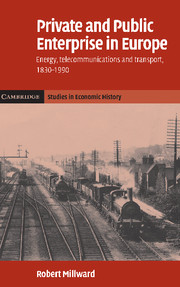Book contents
- Frontmatter
- Contents
- List of figures
- List of tables
- Preface
- Glossary and abbreviations
- Map: The European economy in 1914
- Part I Introduction
- 1 Ideology, technology and economic policy
- Part II The Construction of the New European Infrastructure c. 1830–1914
- Part III Nations and Networks c. 1914–1945
- Part IV State Enterprise c. 1945–1990
- Part V Conclusions
- Appendix: Infrastructure service levels and public ownership c. 1910: a statistical analysis
- Bibliography
- Index
1 - Ideology, technology and economic policy
Published online by Cambridge University Press: 14 July 2009
- Frontmatter
- Contents
- List of figures
- List of tables
- Preface
- Glossary and abbreviations
- Map: The European economy in 1914
- Part I Introduction
- 1 Ideology, technology and economic policy
- Part II The Construction of the New European Infrastructure c. 1830–1914
- Part III Nations and Networks c. 1914–1945
- Part IV State Enterprise c. 1945–1990
- Part V Conclusions
- Appendix: Infrastructure service levels and public ownership c. 1910: a statistical analysis
- Bibliography
- Index
Summary
How effectively have energy, transport and telecommunications been delivered over the last two centuries? What role was played by ideologies of socialism and capitalism? What has been the role of government? These sectors, sometimes called infrastructure industries, provide services and commodities that meet both a commercial demand (a rail service for tourists, mobile phones) and a public service (road, rail and telephone links for military/strategic aims). They have traditionally been delivered by enterprises that have a commercial orientation. Many are, or were, in complete private ownership like the Electric and International Telegraph Company, Edison, the Berlin Tramways Company, British Telecom. Some, such as the oil distributor British Petroleum, the German electricity utility Rheinisch-Westfalisches Elektrizitätswerk and the Danish telephone enterprise Fyas Communale had mixed private/public ownership. Others were run by local government: the Bologna municipal gas undertaking, the London Metropolitan Water Board. Others were state-owned enterprises: Alitalia, the French railway enterprise Société Nationale des Chemins de Fer Français, the National Coal Board in Britain, the telecommunications enterprises in Spain (Telefónica), Germany (Deutsche Bundespost) and Sweden (Televerket). Some then were privately owned enterprises, many still are, some are public but in all cases their position on the border between the private and the public sector make them of special interest in the economic history of Western Europe. This book analyses the development of energy, transport and communications from the arrival of the railways in the 1830s, through the emergence of large electricity, gas, water and tramways undertakings in the nineteenth century, to the replacement of coal by oil in the mid-twentieth century and the electronic transformation of communications in the 1980s.
- Type
- Chapter
- Information
- Private and Public Enterprise in EuropeEnergy, Telecommunications and Transport, 1830–1990, pp. 3 - 12Publisher: Cambridge University PressPrint publication year: 2005



